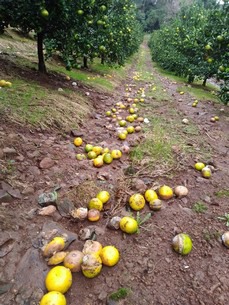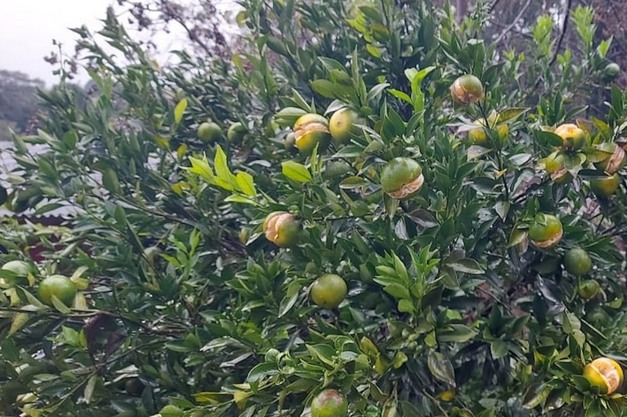The extreme rains and floods in Southern Brazil last month, especially in Rio Grande do Sul, coincided with the final fruiting phase of important citrus varieties, like the bergamot Caí, Ponkan and Pareci, whose harvests were underway.
According to a report released on June 4th by Emater-RS, more than 103,000 tons of bergamot and oranges were lost by more than 7,200 producers in the state. In many orchards, the soil was drenched not only due to flooding, caused by river overflows and runoffs, but also due to several days of heavy rainfall.
 The adverse climate context interfered with the availability of air (soil oxygen), causing hypoxia in the root system of the plants and, in turn, forming abscission layers (tissue death), which induced the production of ethylene and triggered physiological damage to the plants, such as fruit drop. In addition, the abrupt reduction in temperature contributed to the intensity of these production losses.
The adverse climate context interfered with the availability of air (soil oxygen), causing hypoxia in the root system of the plants and, in turn, forming abscission layers (tissue death), which induced the production of ethylene and triggered physiological damage to the plants, such as fruit drop. In addition, the abrupt reduction in temperature contributed to the intensity of these production losses.
Although losses of the current citrus season are certainly worrisome, Luis Bohn, technical assistant manager of Emater/RS-Ascar, however, is concerned with another factor: growers' motivation.
"This past week I met with several growers and felt there is a lack of motivation among many producers, including those producing grapes and citrus," says Bohn.
Motivation, he says, is an important element in any production. They begin to look at the issue of the land, where they are, whether it is worth rebuilding, replanting, etc.

According to Bohn, last year, Rio Grande do Sul had eleven climate events that negatively influenced crops. Now, this latest event which affected the vast majority of the state is making many producers consider changing the location of their production or even leaving farming all together.
"This will be our biggest job, because a grower who is less motivated takes longer to make decisions. They do not plan, and agriculture requires planning," says Bohn, adding, "Production will not be successful if a farmer looks at his orchard and is not reminded that he has to prune it by the end of July."
For more information:
Luis Bohn
Emater/RS-Ascar
lbohn@emater.tche.br
